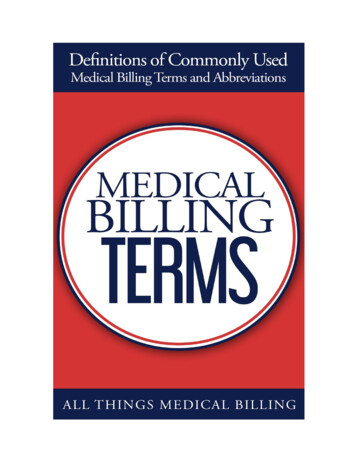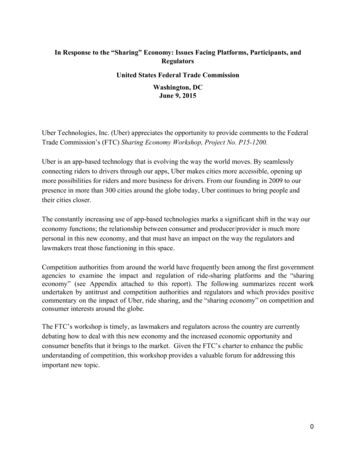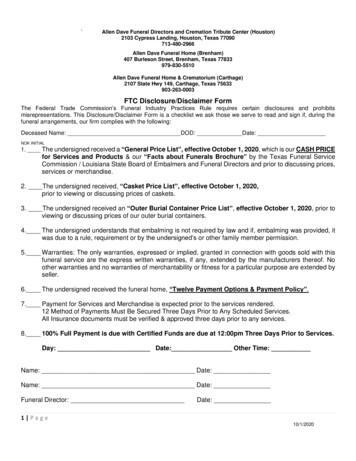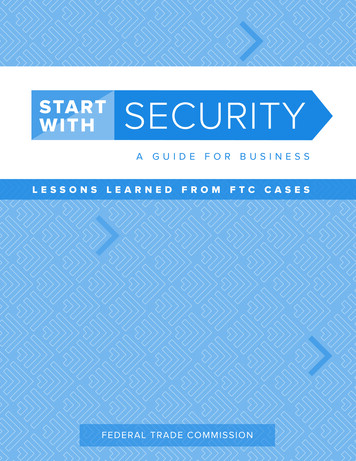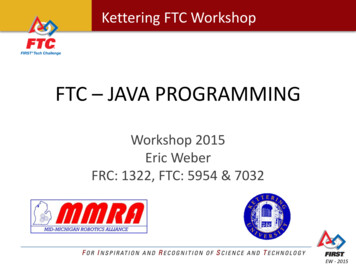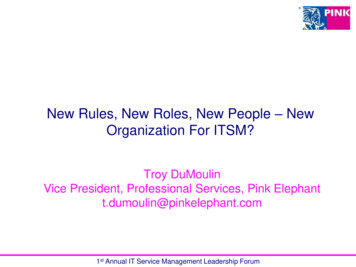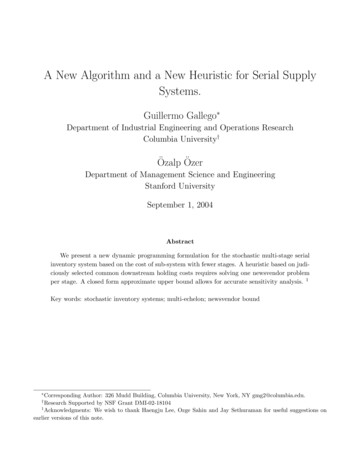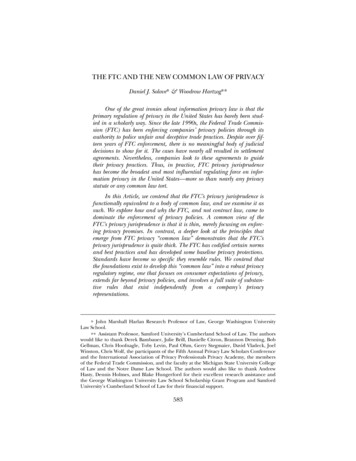
Transcription
THE FTC AND THE NEW COMMON LAW OF PRIVACYDaniel J. Solove & Woodrow Hartzog One of the great ironies about information privacy law is that theprimary regulation of privacy in the United States has barely been studied in a scholarly way. Since the late 1990s, the Federal Trade Commission (FTC) has been enforcing companies’ privacy policies through itsauthority to police unfair and deceptive trade practices. Despite over fifteen years of FTC enforcement, there is no meaningful body of judicialdecisions to show for it. The cases have nearly all resulted in settlementagreements. Nevertheless, companies look to these agreements to guidetheir privacy practices. Thus, in practice, FTC privacy jurisprudencehas become the broadest and most influential regulating force on information privacy in the United States—more so than nearly any privacystatute or any common law tort.In this Article, we contend that the FTC’s privacy jurisprudence isfunctionally equivalent to a body of common law, and we examine it assuch. We explore how and why the FTC, and not contract law, came todominate the enforcement of privacy policies. A common view of theFTC’s privacy jurisprudence is that it is thin, merely focusing on enforcing privacy promises. In contrast, a deeper look at the principles thatemerge from FTC privacy “common law” demonstrates that the FTC’sprivacy jurisprudence is quite thick. The FTC has codified certain normsand best practices and has developed some baseline privacy protections.Standards have become so specific they resemble rules. We contend thatthe foundations exist to develop this “common law” into a robust privacyregulatory regime, one that focuses on consumer expectations of privacy,extends far beyond privacy policies, and involves a full suite of substantive rules that exist independently from a company’s privacyrepresentations. John Marshall Harlan Research Professor of Law, George Washington UniversityLaw School. Assistant Professor, Samford University’s Cumberland School of Law. The authorswould like to thank Derek Bambauer, Julie Brill, Danielle Citron, Brannon Denning, BobGellman, Chris Hoofnagle, Toby Levin, Paul Ohm, Gerry Stegmaier, David Vladeck, JoelWinston, Chris Wolf, the participants of the Fifth Annual Privacy Law Scholars Conferenceand the International Association of Privacy Professionals Privacy Academy, the membersof the Federal Trade Commission, and the faculty at the Michigan State University Collegeof Law and the Notre Dame Law School. The authors would also like to thank AndrewHasty, Dennis Holmes, and Blake Hungerford for their excellent research assistance andthe George Washington University Law School Scholarship Grant Program and SamfordUniversity’s Cumberland School of Law for their financial support.583
584COLUMBIA LAW REVIEW[Vol. 114:583INTRODUCTION . 585I. THE FTC’S RISE AS PRIVACY REGULATOR . 590A. The Rise of Privacy Policies . 590B. Privacy Policies as Contract? . 595C. The Dawn of FTC Privacy Enforcement . 598D. The Ascendency of the FTC as the De Facto Data ProtectionAuthority . 6001. Expansion of Jurisdiction . 6022. The Lynchpin Function of FTC Enforcement. 604II. FTC SETTLEMENTS AS DE FACTO COMMON LAW . 606A. The Anatomy of an FTC Action . 608B. FTC Settlements . 6101. Prohibitions on Wrongful Activities . 6142. Fines and Other Monetary Penalties . 6153. Consumer Notification and Remediation. 6164. Deleting Data or Refraining from Using It . 6165. Making Changes in Privacy Policies . 6176. Establishing Comprehensive Programs. 6177. Assessments by Independent Professionals. 6188. Recordkeeping and Compliance Reports . 6189. Notification of Material Changes Affecting Compliance . 619C. The Privacy “Common Law” of the FTC . 6191. FTC Settlements . 6202. FTC Reports and Materials . 625III. JURISPRUDENCE OF THE NEW COMMON LAW OF PRIVACY . 627A. An Overview of FTC Privacy Jurisprudence . 6271. Deception . 628a. Broken Promises of Privacy . 628b. General Deception . 630c. Insufficient Notice . 634d. Data Security . 6362. Unfairness. 638a. Retroactive Changes . 640b. Deceitful Data Collection . 641c. Improper Use of Data. 642d. Unfair Design or Unfair Default Settings. 642e. Unfair Data Security Practices . 6433. Statutory and Safe Harbor Enforcement . 643a. FCRA . 645b. COPPA . 646
2014]FTC AND PRIVACY COMMON LAW585c. GLBA . 647d. Safe Harbor . 647B. Developmental Patterns of FTC Privacy Jurisprudence . 6481. Evolution from General to Specific Standards . 6492. Incorporation of Qualitative Judgments . 6583. Establishing Baseline Standards . 6614. Recognizing Indirect Liability . 663IV. TOWARD A MORE COMPLETE PRIVACY REGULATORY REGIME . 666A. From Broken Promises to Broken Expectations . 667B. Beyond the Four Corners of Privacy Policies . 669C. Developing Substantive Rules. 672CONCLUSION . 676INTRODUCTIONOne of the great ironies about information privacy law is that theprimary regulation of privacy in the United States has barely been studied in a scholarly way. Since the late 1990s, the Federal TradeCommission (FTC or “Commission”) has been enforcing companies’privacy policies through its authority to police unfair and deceptive tradepractices.1 The FTC has also been enforcing several privacy statutes andthe Safe Harbor Agreement that enables companies to transfer data between the United States and the European Union.2Despite over fifteen years of FTC enforcement, there are hardly anyjudicial decisions to show for it. The cases have nearly all resulted in settlement agreements. Nevertheless, companies look to these agreementsto guide their decisions regarding privacy practices. Those involved withhelping businesses comply with privacy law—from chief privacy officersto inside counsel to outside counsel—parse and analyze the FTC’s settlement agreements, reports, and activities as if they were pronouncements by the Chairman of the Federal Reserve. Thus, in practice, FTCprivacy jurisprudence has become the broadest and most influential reg1. See, e.g., Marcia Hofmann, Federal Trade Commission Enforcement of Privacy, inProskauer on Privacy § 4:1.2 (Kristen J. Mathews ed., 2012) (discussing FTC’s authority toensure individuals and businesses do not engage in unfair or deceptive acts); AndrewSerwin, The Federal Trade Commission and Privacy: Defining Enforcement andEncouraging the Adoption of Best Practices, 48 San Diego L. Rev. 809, 811 (2011) (tracingdevelopment of FTC’s role in consumer protection enforcement).2. A Brief Overview of the Federal Trade Commission’s Investigative and LawEnforcement Authority, FTC (July 2008) [hereinafter Overview of FTC Authority], t-authority (on file with the Columbia LawReview) (explaining “Commission enforces a variety of specific consumer protectionstatutes . . . prohibit[ing] specifically-defined trade practices and generally specify[ing]that violations . . . be treated as if they were ‘unfair or deceptive’ acts or practices underSection 5(a),” including Truth-in-Lending Act, Fair Credit Reporting Act, and Children’sOnline Privacy Protection Act).
586COLUMBIA LAW REVIEW[Vol. 114:583ulating force on information privacy in the United States—more so thannearly any privacy statute or common law tort. It is therefore quite surprising that so little scholarly attention has been devoted to the FTC’sprivacy jurisprudence.In this Article, we endeavor to map this uncharted terrain. We explore how and why the FTC, and not contract law, came to dominate theenforcement of privacy policies. We seek to understand why the FTCjurisprudence developed the way that it did and how it might develop inthe future. We contend that the FTC’s privacy jurisprudence is functionally equivalent to a body of common law, and we examine it as such.One reason for the scant focus on the FTC might be because of theperception that the FTC’s privacy jurisprudence is rather thin, merelyfocusing on enforcing privacy promises. In contrast, a deeper look at theprinciples that emerge from FTC privacy “common law” demonstratesthat the FTC’s privacy jurisprudence is quite thick. The FTC has codifiedcertain norms and best practices and has developed some baseline privacy protections. Standards have become so specific they resemble rules.The FTC has thus developed a surprisingly rich jurisprudence. We contend that the foundations exist to develop this “common law” into arobust privacy regulatory regime, one that focuses on consumer expectations of privacy, extends far beyond privacy policies, and involves a fullsuite of substantive rules that exist independently from a company’s privacy representations.Comparisons between privacy regulation in the United States andEuropean Union have often pointed out E.U. law’s comprehensivenessin contrast with U.S. law’s fragmentation and hollow standards, whichprovide few limits on the collection, use, and disclosure of personaldata.3 But such comparisons are increasingly becoming outdated as FTCprivacy jurisprudence develops and thickens.3. See, e.g., Robert Gellman, A Better Way to Approach Privacy Policy in the UnitedStates: Establish a Non-Regulatory Privacy Protection Board, 54 Hastings L.J. 1183, 1205(2003) (“The FTC’s endorsement of a diluted version of [Federal Information ProcessingStandards] is one reason that the Commission is not a good candidate to serve a largerrole in privacy policy. The Commission’s privacy vision is too limited . . . [and] does nothave jurisdiction over many private sector, non-profit, and governmental recordkeepers.”); Allyson W. Haynes, Online Privacy Policies: Contracting Away Control overPersonal Information?, 111 Penn St. L. Rev. 587, 606 (2007) (asserting focus of FTC andstate enforcement is on “website’s adherence to its promises, not a general standard offairness”); Ryan Moshell, . . . And Then There Was One: The Outlook for a SelfRegulatory United States Amidst a Global Trend Toward Comprehensive Data Protection,37 Tex. Tech L. Rev. 357, 383 (2005) (discussing “FTC’s inadequacy and toothlessness inensuring privacy protection”); James P. Nehf, Recognizing the Societal Value inInformation Privacy, 78 Wash. L. Rev. 1, 58 (2003) (discussing “holes in this patchwork ofsector-specific privacy laws”); Joel R. Reidenberg, Privacy Wrongs in Search of Remedies,54 Hastings L.J. 877, 887–88 (2003) (asserting U.S. information privacy “is protected onlythrough an amalgam of narrowly targeted rules . . . [that] leave[] many significant gapsand fewer clear remedies”); Gregory Shaffer, Globalization and Social Protection: TheImpact of EU and International Rules in the Ratcheting Up of U.S. Privacy Standards, 25
2014]FTC AND PRIVACY COMMON LAW587It is fair to say that today FTC privacy jurisprudence is the broadestand most influential regulating force on information privacy in theUnited States—more so than nearly any privacy statute or common lawtort. The statutory law regulating privacy is diffuse and discordant, andcommon law torts fail to regulate the majority of activities concerningprivacy.4Privacy law in the United States has developed in a fragmented fashion and is currently a hodgepodge of various constitutional protections,federal and state statutes, torts, regulatory rules, and treaties. Unlike theprivacy laws of many industrialized nations, which protect all personaldata in an omnibus fashion, privacy law in the United States is sectoral,with different laws regulating different industries and economic sectors.There is a law for video records and a different law for cable records.5The Health Insurance Portability and Accountability Act (HIPAA) protects the privacy of health data,6 but a different regime governs the priva
emerge from FTC privacy “common law” demonstrates that the FTC’s privacy jurisprudence is quite thick. The FTC has codified certain norms and best practices and has developed some baseline privacy protections. Standards have become so specific they resemble rules. We contend that the foundations exist to develop this “common law” into a robust privacy regulatory regime, one that .
